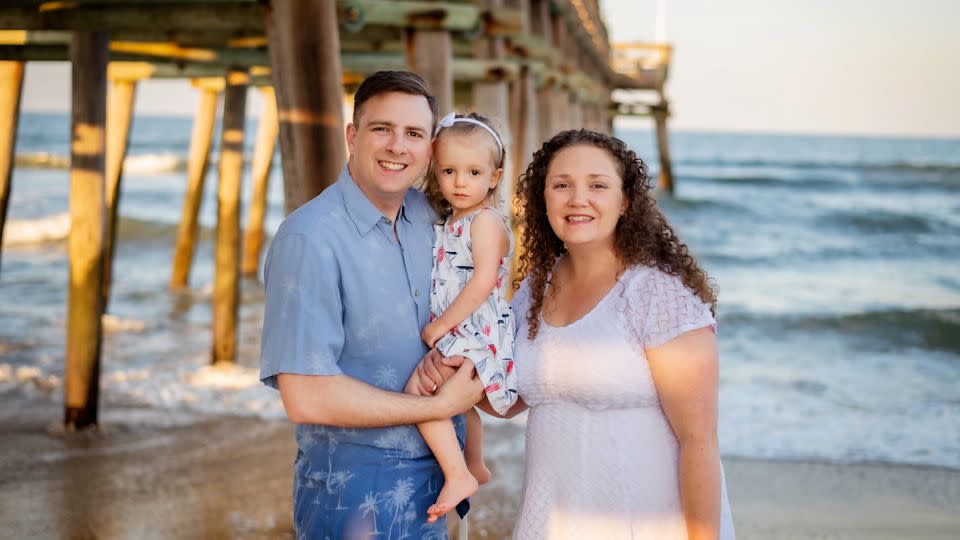A military family faces uncertainty over having another child with the help of IVF after Alabama’s Supreme Court ruling

Julie Eshelman and her husband conceived their 2-year-old daughter through in vitro fertilization and kept their frozen embryos in storage, hoping to keep available a vital option for growing their family.
But with the military family potentially being redeployed to Alabama, that option is now shrouded with uncertainty following a recent state Supreme Court ruling, Eshelman told CNN’s Kaitlan Collins on Wednesday.
In its unprecedented decision, the Alabama Supreme Court said embryos are children – even if they’re outside of a uterus – and that those who destroy them can be held liable for wrongful death. Experts say the decision will likely make the already high costs of infertility treatments substantially higher and discourage Alabama providers from offering them at all.
The ruling adds another layer of uncertainty to an already difficult and costly process for families like Eshelmans. The couple faces a difficult decision: undertake the risk of moving the embryos to Alabama or a state that could adopt a similar policy, or bear the cost of travel to another state for treatments.
“I don’t even know that I would actually even think about moving them to a state like Alabama, given the current climate, just because I know that they’re safer where they’re at right now,” Eshelman said.
Deciding whether to have children already involves a myriad considerations, especially with a diagnosis of infertility, and the ruling just adds another complication, Eshelman said.
“There’s all these different decisions that go into that, and then now you’re adding the complication of the states getting involved in those decisions and lawmakers and politicians that have opinions on some of these subjects,” Eshelman said.
In vitro fertilization, or IVF, can result in multiple embryos that can be frozen and stored in fertility clinics or cryopreservation centers for several hundred dollars annually, keeping them viable for future use.
Though the Alabama court’s decision does not prohibit IVF, critics warn the ruling could discourage medical providers from performing infertility treatments in fear of being held liable each time an embryo does not turn into a successful pregnancy and force parents to pay for lifelong storage fees of embryos they will never be allowed to discard, even if they don’t want any more children.
Already the University of Alabama at Birmingham health care system has announced it is pausing IVF – and experts predict more providers will soon follow suit.
Two other fertility clinics said Thursday they had halted IVF treatment programs: Alabama Fertility’s clinic in Birmingham has “paused transfers of embryos for at least a day or two,” according to Penny Monella, the chief operating officer at Alabama Fertility Specialists. The Center for Reproductive Medicine at Mobile Infirmary said it will stop treatments on Saturday “to prepare embryos for transfer,” according to a statement from the clinic.
With Alabama set to become their new home, Eshelman and her husband are now unsure what comes next and what it means for their plans to grow their family.
“I don’t even know if we would be able to pursue family-building if we were to be stationed in a state that, with this ruling, suddenly changed their personhood laws or changed access to IVF,” Eshelman said.
Eshelman and her husband are among many couples facing uncertainty after the ruling, including the hundreds of Alabamians who seek infertility treatments each year.
Dr. Mamie McLean, with Alabama Fertility Specialists, told CNN earlier this week she was already hearing from patients who are worried they won’t have control over what happens to their frozen embryos.
“We worry that if this ruling and its worst case becomes true, that we will be limited in the ability to keep frozen embryos in the state of Alabama, which will make fertility care riskier and more expensive for patients, and ultimately limit the access to care that women in Alabama have,” McLean said.
“Patients are worried,” she added. “This is adding anxiety and stress to patients who are already going through a lot to build their families.”
The Medical Association of the State of Alabama warned that the ruling could leave little to no alternatives for reproductive assistance in the state.
“The significance of (the court’s ruling) impacts all Alabamians and will likely lead to fewer babies – children, grandchildren, nieces, nephews, and cousins – as fertility options become limited for those who want to have a family,” the association said in a release.
CNN’s Isabel Rosales, Christina Maxouris, Meg Tirrell, Chris Youd and Maxime Tamsett contributed to this report.
For more CNN news and newsletters create an account at CNN.com


